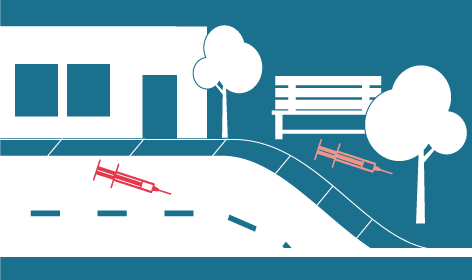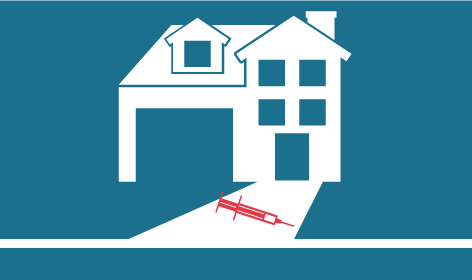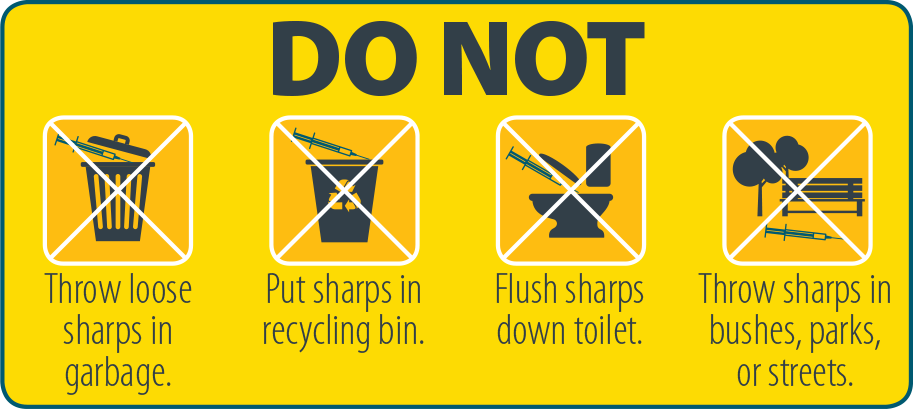If you or someone you care about is struggling with alcohol or other substance use, find the right help for you.
Ontario Naloxone Program
Increasing access to harm reduction services is important to prevent opioid overdose-related harms and deaths. The Ontario Naloxone Program, offered through the Windsor-Essex County Health Unit, distributes naloxone (a drug that can reverse the effects of opioids) to eligible community organizations for their clients who use opioids or are at risk of an opioid overdose, and their friends and families.
The Health Unit’s website is a resource for community partners, to support them in the distribution of Naloxone. Community partners are instrumental to increasing access to naloxone for those who need it the most.
If you are a community organization interested in the Naloxone Program and would like more information, please call the Chronic Disease and Injury Prevention Department at the Windsor-Essex County Health Unit at 519-258-2146, extension 3100.
Breaking Free Online
A free online support tool designed to help individuals manage substance use. Breaking Free Online uses practical, self-guided courses, coping skills, and behaviour change techniques to support individuals in recovery and to help prevent a relapse. It can be used independently, as part of an ongoing mental health or substance use treatment program supervised by clinicians, practitioners, and service providers, or be supported by any service provider working within social services. The program is free for Ontarians ages 16+ and is available online 24/7 in English and French. Learn more
Needle Syringe Programs
Needle syringe programs are a harm reduction strategy that aims to reduce the potential health, social, and economic effects associated with drug use -- meeting people who use substances where they are at.
Sharing needles and other drug equipment or reusing used needles can put individuals at risk of getting an infection, such as group A streptococcal disease, hepatitis C, hepatitis B, and HIV.
Needle syringe programs offer free harm reduction supplies, such as new needles and other drug equipment. They also offer needle disposal bins, a place to return used needles, to be disposed of safely. Educational resources regarding harm reduction strategies are also provided.
Needle syringe programs available in Windsor-Essex County are located at:
- Pozitive Pathways Community Services: 511 Pelissier St., Windsor
- Welcome Centre Shelter for Women: 500 Tuscarora Street, Windsor
Find out where you can find other needle syringe programs.
Safe Needle Disposal
There are many reasons why people use needles, including for health conditions. Needles that are not disposed of properly can pose a safety risk to our community. Needlestick injuries, sharing needles, and other drug equipment can put you at risk for getting an infection.
CITY PROPERTY (sidewalk, street, boulevard, park, trail, or facility)
- Contact the City of Windsor at 3-1-1 to report the needle and arrange for disposal.
- Outside of the City of Windsor please follow the Steps For Safe Needle Disposal, listed below.

ON MY PROPERTY
- Landlords or property managers who find large quantities of needles may wish to contact a private biohazard company for removal and disposal, and consider installing sharps disposal bins in public areas.
- For data collection (City of Windsor only), report needle find to 3-1-1.

Treat all needles and drug equipment as contaminated. Do not try to recap the needle or break the tip off.
- Put on gloves (latex, garden, or vinyl) to protect yourself from fluid contamination. (These gloves won’t protect against punctures or cuts).
- Using tongs or tweezers, pick up needle by the middle of the plastic tube (syringe) with the sharp end facing down. If there are multiple needles, pick them up one at a time.
- Place the needle sharp end first into a puncture proof, sealable container. Close the container tightly.
- Remove gloves and wash hands with warm soap and water or use hand sanitizer.
- Dispose of containers at sharps disposal bins (throughout the City of Windsor) or at your local pharmacy.
Do not:
- Throw loose sharps in garbage.
- Put sharps in recycling bin.
- Flush sharps down toilet.
- Throw sharps in bushes, parks, or streets.

Download PDF Poster-Kid Friendly
Posters are also available in Arabic and French upon request
You can drop off your used sharps at any 24-hour sharps disposal bins located outdoors at:
- Parking Lot – Windsor-Essex County Health Unit – 962 Pelissier Street
- Parking Lot – Windsor-Essex County Health Unit – 972 Goyeau Street
- Pozitive Pathways Community Services – 511 Pelissier Street
- Bruce Park - East side of park facing Church Street
- Wigle Park – 1037 McDougall Street (west side of park)
- Homelessness and Housing Help Hub (H4) – 400 Wyandotte Street East
- Community Housing, Marentette Neighbourhood – Interior courtyard (behind Waterworld)
- Fire Headquarters – 815 Goyeau Street at Elliot (on Dufferin Place)
- Senator Croll Park – West side facing Goyeau
- Downtown Transit Terminal – 300 Chatham Street West
- Ford City Parkette – Corner of Whelpton and Drouillard
- Riverfront – 620 Riverside Drive West (beside Caron Avenue Pumping Station)
- Campbell Cottages – 1100 Campbell Avenue (back parking lot of Community Housing Complex)
- Municipal Parking Lot #6 – Behind 1033 Wyandotte Street East (between Langois and Marion)
- Welcome Centre Shelter for Women and Families – 500 Tuscarora Street (North side of the entrance in the parking lot)
- Talbot Street West Trail – Leamington (South trail entrance)
- Russell Street Parking Lot – Leamington (Northwest corner)
- Princess Street Parking Lot – 33 Princess Street, Leamington (Southwest corner in the parking lot)
- Leamington Salvation Army – 88 Setterington Street (in the parking lot)
- 7-Eleven – 138 Erie Street South, Leamington (Southeast corner in the parking lot)
You can also search for a community disposal bin in your area/community.
Needle syringe programs are a harm reduction strategy that aims to reduce the potential health, social, and economic effects associated with drug use by meeting people who use substances where they are at.
Sharing needles and other drug equipment or reusing used needles can put individuals at risk of getting an infection, such as group A streptococcal disease, hepatitis C, hepatitis B, and HIV.
Needle syringe programs offer free harm reduction supplies, such as new needles and other drug equipment. They also offer needle disposal bins and a place to return used needles to be disposed of safely. Educational resources regarding harm reduction strategies are also provided.
Needle syringe programs available in Windsor-Essex County are located at:
- Pozitive Pathways Community Services: 511 Pelissier St., Windsor
- Welcome Centre Shelter for Women: 263 Bridge Ave, Windsor
Find out where you can find other needle syringe programs.

